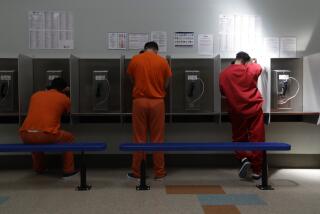Judge denies request to release medically vulnerable federal inmates from San Diego detention center
The decision contrasts with the same judge’s ruling in recent weeks to let out detainees in immigration custody at the same facility due to the COVID-19 outbreak there
- Share via
SAN DIEGO — A federal judge over the weekend denied a request from medically vulnerable inmates in federal criminal custody at Otay Mesa Detention Center in San Diego County to be released because of the COVID-19 outbreak there.
The decision comes less than two weeks after the same U.S. District judge — Dana Sabraw — ordered Immigration and Customs Enforcement to review the cases of those in its custody at the facility and release as many detainees as possible who are medically vulnerable to the novel coronavirus.
While Sabraw wrote in his order that he did not dispute inmates’ concerns raised by the American Civil Liberties Union, he could not grant the temporary restraining order because of a 1996 law that limits judges’ ability to order released people who are in criminal custody.
“The 5th Amendment prohibits punishment of detained persons prior to ‘a formal adjudication of guilt’ but cannot require a complete elimination of all risk of contracting the virus,” Sabraw wrote in his decision. “Holding otherwise would place an impossible burden on detention facilities.”
Otay Mesa, run by private prison company CoreCivic, holds both ICE detainees who are waiting for immigration court hearings and U.S. Marshals Service inmates who are waiting for trials or sentencing in criminal cases.
Detainees and inmates have long said that not enough was being done to protect them from getting the virus. CoreCivic and the federal law enforcement agencies involved have maintained that they’ve followed national guidelines during the pandemic for people held in custody.
When asked for comment, CoreCivic deferred to the U.S. Marshals Service, which did not immediately respond to a request from the San Diego Union-Tribune.
The ACLU of San Diego & Imperial Counties and the National Immigration Project said they would continue to fight for the release of people in U.S. Marshals Service custody.
“U.S. Marshals Service has failed to act to mitigate the life-threatening risks to which these individuals — many of them in pretrial detention — are currently exposed,” the organizations said in a joint statement. “These circumstances violate detained individuals’ constitutional rights to due process and to be free from cruel and unusual punishment.”
The rise in COVID-19 cases at the facility has become the biggest outbreak in the county, officials said last week, and it is the largest outbreak among immigration detainees nationwide.
About 31% of confirmed positive cases among those in custody at the facility are of U.S. Marshals Service inmates.
As of Sunday afternoon, 67 U.S. Marshals Service inmates at Otay Mesa had tested positive for the virus, according to facility documents obtained by the Union-Tribune. And 150 ICE detainees had tested positive, bringing the total number of positive cases at the facility to 217.
Among those cases, two people are hospitalized, according to the documents. Another person was hospitalized but has since returned to the detention center. One man, Carlos Ernesto Escobar Mejia, died last week after being hospitalized.
For the women in U.S. Marshals Service custody who have already tested positive, the wait for Sabraw’s decision after a hearing in the case early last week seemed too long.
“I can’t explain to you how I feel,” said Guadalupe Rivera in a phone interview. “It’s horrible. It’s frustrating. We can’t do anything. Nobody will hear us. Nobody will do anything for us. Nobody cares about us, period.”
On Friday, the day before Sabraw made his decision, Rivera passed the phone among several women with COVID-19 to share their concerns.
Several, including Rivera, have medical conditions such as diabetes and asthma that can make a person more likely to have serious symptoms or die from the virus.
The women said staff call them “the walking dead.”
Amanda Gilchrist, spokeswoman for CoreCivic, said the warden has not been made aware of this or received any official grievance from the women.
With so much focus on ICE detainees and on people who hadn’t yet gotten sick, the women said, they felt forgotten.
Morrissey writes for the San Diego Union-Tribune.
More to Read
Sign up for Essential California
The most important California stories and recommendations in your inbox every morning.
You may occasionally receive promotional content from the Los Angeles Times.











